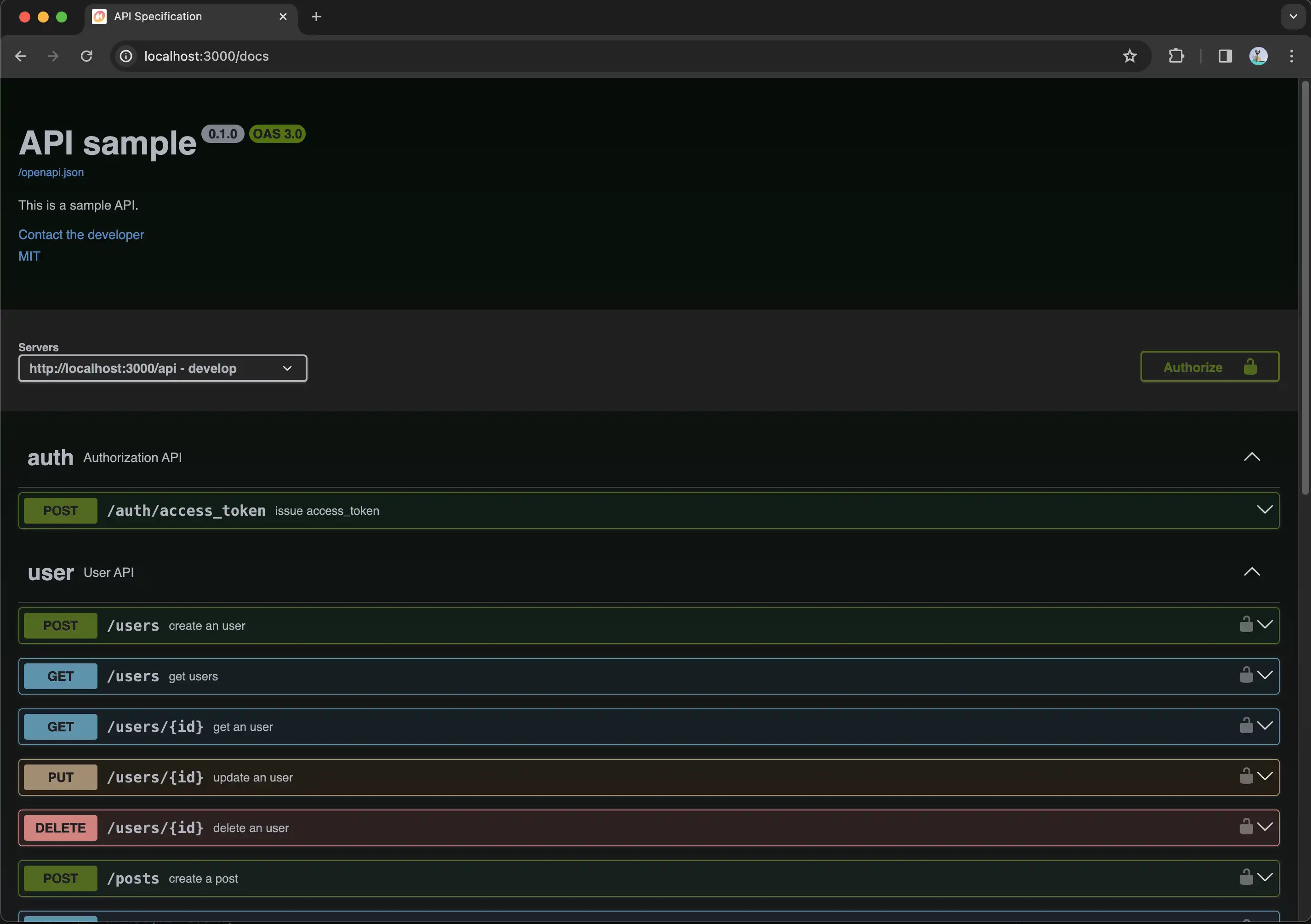API 仕様書を作る
API 仕様書
API 仕様書は、openapi.json などを出力して渡し、それを好きなツールで見てもらえれば良いと個人的には思うが、それで許してくれるクライアントは滅多にいない。openapi.json は提供しつつ、最初から用意しておけば文句も出ない。
とは言え、API 仕様書を書くのは大変だ。アクティブに開発をしている段階では、逐一アップデートしていくのも大変なので、なるべく自動化したい。最終的には、それほど自動か?という程度にしかならなかったが、ひとつひとつせっせと書くのに比べれば遥かに楽、という程度になった。もっと自動化したいが、これ以上は難しいかも知れない。
API 仕様書のガワを作る
まず、先にガワを作る。以前は、@stoplight/element を利用したが、今回は、swagger-ui-react を使うことにする。
$ yarn add swagger-ui-react
$ yarn add @types/swagger-ui-react --dev
各種ファイルの配置は以下の通り。
├── public
│ └── openapi.json
└── src
├── app
│ └── docs
│ ├── page.tsx
│ └── swagger-ui.css
└ globals.css
/docs でアクセスできる。(ex. http://localhost:3000/docs)
基本的には、Production では表示しないようにするなどの処理が必要になる。アクセス制限は、サーバ側で行うことにして、ここではやらないが、念の為実装しておいても良い。
/docs/page.tsx では、swagger-ui-react を読み込んで、openapi.json を読み込むようにする。
App Route ではページは、`page.tsx` を作成する。
```tsx:src/app/docs/page.tsx
'use client';
import dynamic from 'next/dynamic';
import 'swagger-ui-react/swagger-ui.css';
import './swagger-ui.css';
const DynamicSwaggerUI = dynamic(() => import('swagger-ui-react'), {
ssr: false,
loading: () => <p>Loading Component...</p>,
});
export default function APISpecification() {
return (
<>
<title>API Specification</title>
<main>
<DynamicSwaggerUI url="/openapi.json" />
</main>
</>
);
}
swagger-ui-react では、読み込むソースは URL で指定して、ローカルファイルが読み込めないので、public ディレクトリに openapi.json を配置し、'use client'; とする。
build すると動かなくなる。container にしてサーバに Deploy したいので、Dynamic Component として、ssr: false とする必要がある。
swagger-ui は見慣れてはいるが、私には眩しすぎたので、Dark モードを付け加えた。最近ご執心の日本の伝統色 をベースに、目に優しい色使いになっている!(今回 1 番の満足ポイント)

openapi.json を生成する
あとは、openapi.json を書くだけ…なのだが、正直これが 1 番面倒くさい。これをなるべく手間をかけずに生成できる必要がある。
Zod を使っているので、それをうまいこと使いたいと思い、今回は zod-to-openapi を使うことにした。
$ yarn add @asteasolutions/zod-to-openapi
zod-prisma-types で生成したスキーマをそのまま使えれば良かったのだが、openapi.json 用には、description と example が足らないし、response の形やクエリパラメータなどは、こちらの実装次第。
また、 /api/auth/access_token、/api/health など、特定の model に依存しないものは生成されないので、せっせと書くことにする。
ファイルをどこに置くかは、かなり悩んだ。openapi.json の生成に関連するファイルは、サーバに Deploy する必要がないため、src ディレクトリ外に置いておきたいが、前述の生成された zod のスキーマと別の場所というのも整理されていない気もするし、この後 EntryPoint の作成をテンプレート化し、実装ではなく設定にしたいので…
openapi.json で書くことは、このシステムの場合、prisma クエリの別表現とも言えるので、同じファイルで設定するのが迷子にならなくて良かろう。と一旦結論づけた。
├── src/app/schemas
│ ├── config
│ │ ├── models
│ │ │ └── UserSchema.ts
│ │ ├── AuthSchema.ts
│ │ ├── Commons.ts
│ │ ├── ExtendedModels.ts
│ │ ├── HealthSchema.ts
│ │ └── index.ts
│ └── BuildOpenApiSchema.ts
└── tools
├── openapi
│ ├── Configs.ts
│ └── EntryPoints.ts
└ GenerateOpenAPI.ts
まず、src/app/schemas/config/ExtendedModels.ts にて、description と example を追加する。
import { UserSchema } from '@/schemas/zod';
import { Ex } from './Commons';
export const UserModelSchema = UserSchema.extend({
id: UserSchema.shape.id.describe('user id').openapi(Ex.cuid),
userName: UserSchema.shape.userName
.describe('unique user name')
.openapi(Ex.name),
imageUrl: UserSchema.shape.imageUrl.describe('user image').openapi(Ex.image),
createdAt: UserSchema.shape.createdAt
.describe('created date')
.openapi(Ex.date),
updatedAt: UserSchema.shape.updatedAt
.describe('updated date')
.openapi(Ex.date),
});
こんな感じで、zod-prisma-types で生成した各 model スキーマを拡張する。example は都度書くのが面倒なので、src/app/schemas/config/Commons.ts 内にまとめた。Commons.ts には、その他に、GET 時の共通なクエリや、エラーレスポンスに関する設定をまとめた。
src/schemas/config/models/UserSchema.ts には、Prisma 用の設定と、OpenAPI 用の設定が含まれる。運用のイメージとしては、新しい EntryPoint を作る際に、このファイルだけをいじるようにし、実装ではなく設定させるようにしたい。そうすることでバグやレビューの手間などが減らせる。
いったん、OpenAPI の部分だけをかいつまんで。
import ...
/**
* PRISMA CONFIGS
* *PrismaSelect: selected columns. if select all, leave it as {}
* *PrismaInclude: included columns
* format*Params: connect etc. if no relational post/put query, just return params.
*/
export const UserPrismaSelect = {};
export const UserPrismaInclude = {...};
export function formatUserParams(params: Partial<RequestType>) {...}
/**
* OPENAPI CONFIGS
* add describe & example
*
* _requestPostSchema: request body for POST request
* _requestPutSchema: request body for PUT request. basically all are optional
* _responseSchema: response body with relations
*/
const _requestPostSchema = ModelSchema.pick({
userName: true,
imageUrl: true,
});
const _requestPutSchema = _requestPostSchema.extend({
userName: _requestPostSchema.shape.userName.optional(),
imageUrl: _requestPostSchema.shape.imageUrl.optional(),
});
const _responseSchema = ModelSchema.merge(
z.object({
posts: z.array(
PostModelSchema.pick({ id: true, title: true, createdAt: true })
),
bookmarks: z.array(
BookmarkModelSchema.pick({ postId: true }).merge(
z.object({
post: PostModelSchema.pick({ title: true, createdAt: true }).merge(
z.object({
author: ModelSchema.pick({
id: true,
userName: true,
imageUrl: true,
}),
})
),
})
)
),
_count: z.object({
posts: z.number().int().openapi(Ex.number),
bookmarks: z.number().int().openapi(Ex.number),
}),
})
);
/**
* OPENAPI PATH CONFIG
* path, summary, description, tags(user/cms), etc
*/
export const UserCreateSchema = builder.getCreateSchema(...);
export const UserFindManySchema = builder.getFindManySchema(...);
export const UserFindUniqueSchema = builder.getFindUniqueSchema(...);
export const UserUpdateSchema = builder.getUpdateSchema(...);
export const UserDeleteSchema = builder.getDeleteSchema(...);
_requestPostSchema は、Create 時の request body の設定、_requestPutSchema は、Update 時の設定で、基本的には任意パラメータに設定する。
_responseSchema は、GET 時の response body の設定で、UserPrismaSelect, UserPrismaInclude で設定した内容と一致するように書く。この作業は、慣れるまで結構面倒くさい。もうちょっと簡単にしたい。
UserCreateSchema ~ UserDeleteSchema は、OpenAPI の path の設定になっている。具体的な内容は、src/schemas/BuildOpenApiSchema.ts 参照。これらを、tools/openapi/EntryPoints.ts にエントリーすると、tools/GenerateOpenAPI.ts が読み込んで openapi.json を吐き出すようになっている。
import { type RouteConfig } from '@asteasolutions/zod-to-openapi';
import * as schm from '@/schemas/config';
type EntryType = {
schema: RouteConfig;
requireAuth: boolean;
isMultiLines: boolean;
slugIdType?: string;
};
export const entries: EntryType[] = [
{ schema: schm.AuthSchema, requireAuth: false, isMultiLines: false },
{ schema: schm.HealthSchema, requireAuth: false, isMultiLines: false },
{ schema: schm.HealthDeepSchema, requireAuth: false, isMultiLines: false },
{ schema: schm.UserCreateSchema, requireAuth: true, isMultiLines: false },
{ schema: schm.UserFindManySchema, requireAuth: true, isMultiLines: true },
...
isMultiLines は、一括取得の場合に、x-total-count を header に埋め込む判定に使う。FindMany だけ true にする。
import ...
const main = async () => {
require('dotenv').config({
path: path.resolve(__dirname, '../.env'),
});
const registry = new OpenAPIRegistry();
extendZodWithOpenApi(z);
// securityScheme
registry.registerComponent(...);
// headers
const headerVersion = registry.registerComponent(...);
const headerCount = registry.registerComponent(...);
// params
const IntIdSchema = registry.registerParameter(
'IntId',
z.number().openapi({
param: {
name: 'id',
in: 'path',
},
...Ex.number,
})
);
const CuidIdSchema = registry.registerParameter(
'CuidId',
z.string().openapi({
param: {
name: 'id',
in: 'path',
},
...Ex.cuid,
})
);
entries.forEach((entry) => {
...
registry.registerPath(path);
});
const generator = new OpenApiGeneratorV3(registry.definitions);
let obj: any = generator.generateDocument(DocumentConfig);
if (process.env.API_VERSION) {
obj.info.version = process.env.API_VERSION;
}
// MEMO: manually add example on slugId schema. reconsider when dredd support 3.0.0
if (obj.components?.parameters && obj.components?.schemas) {
if (obj.components.parameters.IntId && obj.components.schemas.IntId) {
obj.components.parameters.IntId.example =
obj.components.schemas.IntId.example;
}
if (obj.components.parameters.CuidId && obj.components.schemas.CuidId) {
obj.components.parameters.CuidId.example =
obj.components.schemas.CuidId.example;
}
}
const json = JSON.stringify(obj, null, 2);
const file = __dirname + '/../public/openapi.json';
fs.writeFileSync(file, json);
};
main().catch((err) => {
console.error(err);
process.exit(1);
});
こちらはそれほど特筆することはないのだが、変なことやってる点としては、slug パラメータの exapmle が OpenAPI3.0 をサーポートしていない dredd でうまく読み込めないので、マニュアルで追加している点と、
API のバージョンを .env ファイルから読み込んで埋め込んでいる点。あとは、zod-to-openapi のドキュメントを読み込んでいただきたい。
あとは、package.json に scripts を追加して
{
"scripts": {
...
"openapi:generate": "ts-node -r tsconfig-paths/register tools/GenerateOpenAPI.ts",
...
},
...
}
yarn openapi:generate
とすることで、public/openapi.json が生成される。あんまり簡単にはなってない気がするが、前より楽になってるし、いまはいったんこれが精一杯ということでおしまい。